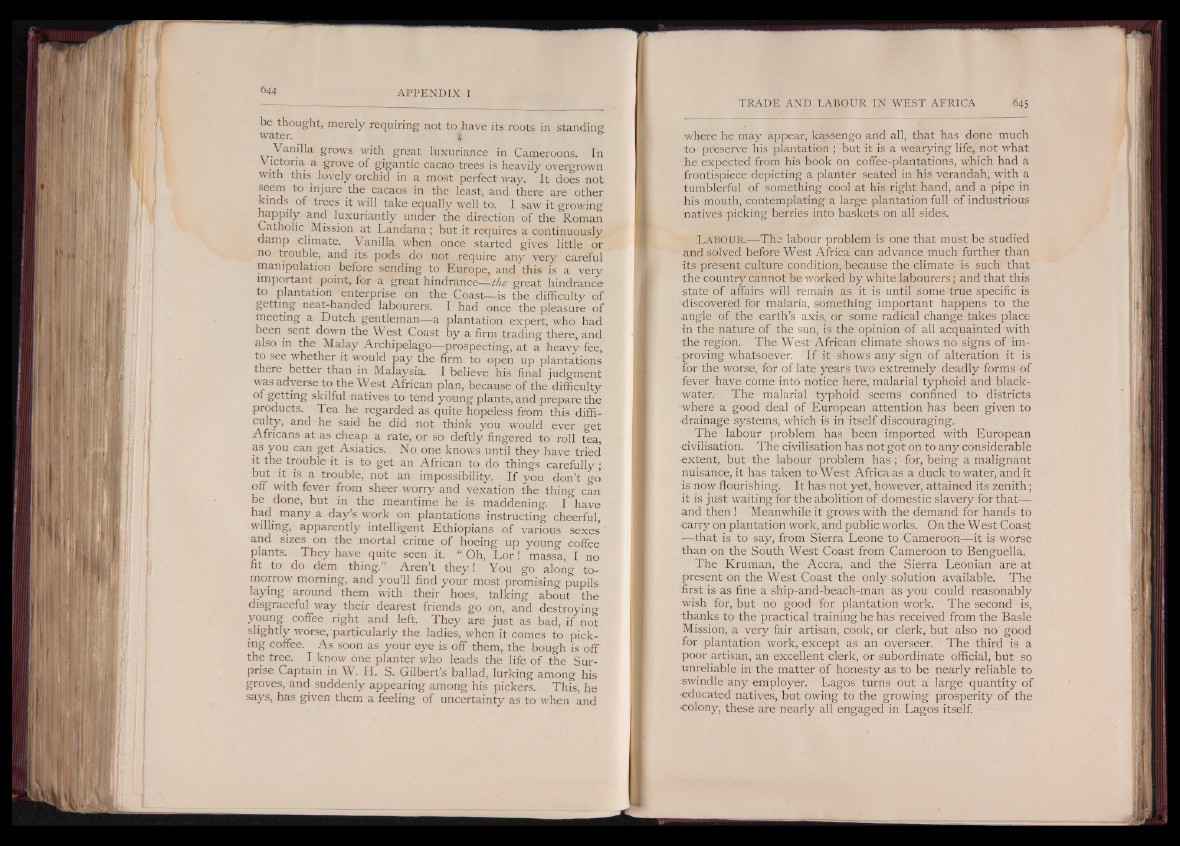
be thought, merely requiring not to have its roots in standing
water. *
Vanilla grows with great luxuriance in Cameroons. In
V ictoria a grove of gigantic cacao trees is heavily overgrown
with this lovely orchid in a most perfect way. It does not
seem to injure the cacaos in the least, and there are other
kinds o f trees it will take equally well to. I saw it -growing
happily and luxuriantly under the direction of the Roman
Catholic Mission at Landana ; but it requires a continuously
damp climate. Vanilla when once started gives little or
no trouble, and its pods do not require any very careful
manipulation before sending to Europe, and this is a very
important point, for a great hindrance—the great hindrance
to plantation enterprise on the Coast— is the difficulty of
getting neat-handed labourers. I had once the pleasure of
meeting a Dutch gentleman— a plantation expert, who had
been sent down the West Coast by a firm trading there* and
also in the Malay Archipelago— prospecting, at a heavy fee,
to see whether it would pay the firm to open up plantations
there better than in Malaysia. I believe his final judgment
was adverse to the West African plan, because of the difficulty
of getting skilful natives to tend young plants, and prepare the
products. Tea he regarded as quite hopeless from this difficulty,
and he said he did not think you would ever get
Africans at as cheap a rate, or so deftly fingered to roll tea,
as you can get Asiatics. No one knows until they have tried
it the trouble it is to get an African to do things carefully;
but it is a trouble, not an impossibility. I f you don’t go
off with fever from sheer worry and vexation the thing can
be done, but in the meantime he is maddening. I have
had many a day’s work on plantations instructing cheerful,
willing, apparently intelligent Ethiopians of various sexes '
and sizes on the mortal crime of hoeing up young coffee
plants. They have quite seen it. “ Oh, L o r ! massa, I no
fit to do dem thing.” Aren’t they! You go along tomorrow
morning, and you’ll find your most promising pupils
laying around them with their hoes, talking about the
disgraceful way their dearest friends go on, and destroying
young coffee right and left. They are just as bad, if not
slightly worse, particularly the ladies, when it comes to picking
coffee. A s soon as your eye is off them, the bough is off
the tree. I know one planter who leads the life of the Surprise
Captain in W. H. S. Gilbert’s ballad, lurking among his
groves, and suddenly appearing among his pickers. This, he
says, has given them a feeling of uncertainty as to when and
where he may appear, kassengo and all, that has done much
to preserve his plantation ; but it is a wearying life, not what
he expected from his book on coffee-plantations, which had a
frontispiece depicting a planter seated in his verandah, with a
tumblerful of something cool at his right hand, and a pipe in
his mouth, contemplating a large plantation full of industrious
natives picking berries into baskets on all sides..
LABOUR.— The labour problem is one that must be studied
and solved before West Africa can advance much further than
its present culture condition, because the climate is such that
the country cannot be worked by white labourers; and that this
■state of affairs will remain as it is until some true specific is
discovered for malaria, something important happens to the
angle o f the earth’s axis, or some radical change takes place
in the nature of the sun, is the opinion o f all acquainted with
the region. The West African climate shows no signs o f improving
whatsoever. I f it shows any sign o f alteration it is
for the worse, for of late years two extremely deadly forms of
fever have come into notice here, malarial typhoid and black-
water. The malarial typhoid seems confined to districts
where a good deal of European attention has been given to
■drainage systems, which is in itself discouraging,.
The labour problem has been imported with European
•civilisation. The civilisation has not got on to any considerable
extent, but the labour problem h a s ; for, being a malignant
nuisance, it has taken to West Africa as a duck to water, and it
Is now flourishing. It has not yet, however, attained its zenith;
it is just waiting for the abolition o f domestic slavery for that—
and then ! Meanwhile it grows with the demand for hands to
earry on plantation work, and public works. On the West Coast
■— that is to say, from Sierra Leone to Cameroon— it is worse
than on the South West Coast from Cameroon to Benguella.
The Kruman, the Accra, and the Sierra Leonian are at
present on the West Coast the only solution available. The
first is as fine a ship-and-beach-man as you could- reasonably
wish for, but no good for plantation work. The second is,
thanks to the practical training he has received from the Basle
Mission, a very fair artisan, cook, or clerk, but also no good
for plantation work, except as an overseer. The third is a
poor artisan, an excellent clerk, or subordinate official, but so
unreliable in the matter o f honesty as to be nearly reliable to
swindle any employer. Lagos turns out a large quantity of
■educated natives, but owing to the growing prosperity o f the
eolony, these are nearly all engaged in Lagos itself.